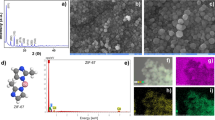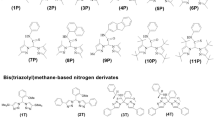Abstract
This study represents synthesis, characterization, screening of antibiofilm efficacy, and cytotoxicity of iridium bis-terpyridine complexes. The complexes were characterized by NMR, MS, FTIR, UV/Visible, and fluorescence spectroscopies. The efficacy of biofilm inhibition and eradication of iridium complexes was evaluated using a crystal violet assay test and verified by fluorescence microscopy. Cytotoxicity and apoptosis analysis of iridium complexes were determined in this study. The results of our study revealed that three iridium complexes had the potential to inhibit biofilm formation and moderate the ability to destroy pre-formed biofilm of S. aureus ATCC 29,213. 250 µM concentration of synthesized complexes showed the highest antibiofilm activity (75% for Ir1, 90% for Ir2, and 71% for Ir3). The significant inhibition obtained at 6.25 µM concentration of Ir2 and Ir3 revealed the potential of our samples. Also, Ir1 and Ir2 complexes had a good capacity to destroy pre-formed biofilm. The results clearly showed that iridium complexes have cytotoxic activity towards colon cancer (Caco-2) and liver cancer (HepG2) cell lines without affecting non-cancerous cells (HEK293) at applied doses. Moreover, tested compounds induced apoptosis in these cancer cells. All of these results showed that iridium complexes had possessed the ability to inhibit or destroy pre-formed biofilm and could be developed as an effective agent against bacterial biofilms. Moreover, these pure substances may have valuable anti-cancer activity and it should be confirmed with further studies for therapeutic effects.









Similar content being viewed by others
References
Alderden RA, Hall MD, Hambley TW (2006) The discovery and development of cisplatin. J Chem Educ 83:728. https://doi.org/10.1021/ed083p728
Baranoff E, Dixon IM, Collin J-P et al (2004) Dyads containing iridium(III) bis-terpyridine as photoactive center: synthesis and electron transfer study. Inorg Chem 43:3057–3066. https://doi.org/10.1021/ic0351038
Böttcher T, Kolodkin-Gal I, Kolter R et al (2013) Synthesis and activity of biomimetic biofilm disruptors. J Am Chem Soc 135:2927–2930. https://doi.org/10.1021/ja3120955
Carrasco AC, Rodríguez-Fanjul V, Habtemariam A, Pizarro AM (2020) Structurally strained half-sandwich iridium(III) complexes as highly potent anticancer agents. J Med Chem 63:4005–4021. https://doi.org/10.1021/acs.jmedchem.9b02000
Chen F, Moat J, McFeely D et al (2018) Biguanide iridium(III) complexes with potent antimicrobial activity. J Med Chem 61:7330–7344. https://doi.org/10.1021/acs.jmedchem.8b00906
Ciofu O, Tolker-Nielsen T (2019) Tolerance and resistance of Pseudomonas aeruginosa biofilms to antimicrobial agents—how P. aeruginosa can escape antibiotics. Front Microbiol 10:913
Collin JP, Dixon IM, Sauvage JP et al (1999) Synthesis and photophysical properties of iridium(III) bisterpyridine and its homologues: a family of complexes with a long-lived excited state. J Am Chem Soc 121:5009–5016. https://doi.org/10.1021/ja9833669
Constable EC, Dunphy EL, Housecroft CE et al (2007) Expanded ligands: Bis(2,2′:6′,2′-terpyridine carboxylic acid)ruthenium(ii) complexes as metallosupramolecular analogues of dicarboxylic acids. J Chem Soc Dalton Trans. https://doi.org/10.1039/b709557k
Feng J, Yee R, Zhang S, Tian L, Shi W, Zhang WH, Zhang Y (2018) A rapid growth-independent antibiotic resistance detection test by SYBR green/propidium iodide viability assay. Front Med 5:1–11
Frei A, Zuegg J, Elliott AG et al (2020) Metal complexes as a promising source for new antibiotics. Chem Sci 11:2627–2639. https://doi.org/10.1039/C9SC06460E
Hierlinger C, Roisnel T, Cordes DB et al (2017) An unprecedented family of luminescent iridium(III) complexes bearing a six-membered chelated tridentate C^N^C Ligand. Inorg Chem 56:5182–5188. https://doi.org/10.1021/acs.inorgchem.7b00328
Husson J, Guyard L (2015) Synthesis of new 4′-(N-alkylpyrrol-2-yl)-2,2′: 6′,2″-terpyridines via N-alkylation of a pyrrole moiety. Heterocycl Commun 21:199–202. https://doi.org/10.1515/hc-2015-0058
Knight TE, Goldstein AP, Brennaman MK et al (2011) Influence of the fluid-to-film transition on photophysical properties of MLCT excited states in a polymerizable dimethacrylate fluid. J Phys Chem B 115:64–70. https://doi.org/10.1021/jp107077t
Kondori T, Akbarzadeh-T N, Ghaznavi H et al (2020) A binuclear iron(III) complex of 5,5′-dimethyl-2,2′-bipyridine as cytotoxic agent. Biometals 33:365–378. https://doi.org/10.1007/s10534-020-00255-z
Leathers TD, Rich JO, Bischoff KM et al (2019) Inhibition of Streptococcus mutans and S. sobrinus biofilms by liamocins from Aureobasidium pullulans. Biotechnol Rep 21:e00300. https://doi.org/10.1016/j.btre.2018.e00300
Licini M, Gareth Williams A (1999) Iridium(III) bis-terpyridine complexes displaying long-lived pH sensitive luminescence. Chem Commun. https://doi.org/10.1039/A906203C
Liu B, Monro S, Li Z et al (2019) New class of homoleptic and heteroleptic bis(terpyridine) iridium(III) complexes with strong photodynamic therapy effects. ACS Appl Bio Mater 2:2964–2977. https://doi.org/10.1021/acsabm.9b00312
Lowe G, Droz AS, Vilaivan T et al (1999) Cytotoxicity of 2,2‘:6‘,2‘ ‘-Terpyridineplatinum(II) complexes against human ovarian carcinoma. J Med Chem 42:3167–3174. https://doi.org/10.1021/jm991053y
Lowe G, Droz AS, Vilaivan T et al (1999) Cytotoxicity of (2,2‘:6‘,2‘ ‘-terpyridine)platinum(II) complexes to Leishmania donovani, Trypanosoma cruzi, and Trypanosoma brucei. J Med Chem 42:999–1006. https://doi.org/10.1021/jm981074c
Lu L, Liu LJ, Chao WC et al (2015) Identification of an iridium(III) complex with anti-bacterial and anti-cancer activity. Sci Rep 5:1–9. https://doi.org/10.1038/srep14544
Ma D-L, Wu C, Wu K-J, Leung C-H (2019) Iridium(III) complexes targeting apoptotic cell death in cancer cells. Molecules 24(15):2739
Olsen I (2015) Biofilm-specific antibiotic tolerance and resistance. Eur J Clin Microbiol Infect Dis 34:877–886. https://doi.org/10.1007/s10096-015-2323-z
Palepu NR, Richard Premkumar J, Verma AK et al (2018) Antibacterial, in vitro antitumor activity and structural studies of rhodium and iridium complexes featuring the two positional isomers of pyridine carbaldehyde picolinic hydrazone ligand. Arab J Chem 11:714–728. https://doi.org/10.1016/j.arabjc.2015.10.011
Penesyan A, Gillings M, Paulsen IT (2015) Antibiotic discovery: combatting bacterial resistance in cells and in biofilm communities. Molecules 20:5286–5298
Prokop A, Czaplewska JA, Clausen M et al (2016) Iridium(III) complexes of terpyridine- and terpyridine-analogous ligands bearing sugar residues and their in vitro activity. Eur J Inorg Chem 2016:3480–3488. https://doi.org/10.1002/ejic.201600325
Qin L-Q, Zou B-Q, Qin Q-P et al (2020) Highly cytotoxic, cyclometalated iridium(iii)-5-fluoro-8-quinolinol complexes as cancer cell mitochondriotropic agents. New J Chem 44:7832–7837. https://doi.org/10.1039/D0NJ00465K
Sahin C, Oner I, Varlikli C (2014) Structural and optical properties of new yellow emitting iridium(III) complexes and their application as an active layer component in white organic light-emitting diodes. RSC Adv 4:46831–46839. https://doi.org/10.1039/C4RA08228A
Schillaci D, Arizza V, Dayton T et al (2008) In vitro anti-biofilm activity of Boswellia spp. oleogum resin essential oils. Lett Appl Microbiol 47:433–438. https://doi.org/10.1111/j.1472-765X.2008.02469.x
Tong SYC, Davis JS, Eichenberger E et al (2015) Staphylococcus aureus infections: epidemiology, pathophysiology, clinical manifestations, and management. Clin Microbiol Rev 28:603–661. https://doi.org/10.1128/CMR.00134-14
Xu J, Yang C, Tong B et al (2013) The effects of different solvents and excitation wavelength on the photophysical properties of two novel Ir(III) complexes based on phenylcinnoline ligand. J Fluoresc 23:865–875. https://doi.org/10.1007/s10895-013-1229-3
Xu Z, Yang Y, Jia X et al (2020) Novel cyclometalated iridium(iii) phosphine-imine (P^N) complexes: highly efficient anticancer and anti-lung metastasis agents in vivo. Inorg Chem Front 7:1273–1283. https://doi.org/10.1039/C9QI01492F
Zhang C, Lai S-H, Yang H-H et al (2017) Photoinduced ROS regulation of apoptosis and mechanism studies of iridium(III) complex against SGC-7901 cells. RSC Adv 7:17752–17762. https://doi.org/10.1039/C7RA00732A
Zhang H, Guo L, Tian Z et al (2018) Significant effects of counteranions on the anticancer activity of iridium(III) complexes. Chem Commun 54:4421–4424. https://doi.org/10.1039/C8CC01326H
Zheng Y, He L, Zhang D-Y et al (2017) Mixed-ligand iridium(III) complexes as photodynamic anticancer agents. Dalton Trans 46:11395–11407. https://doi.org/10.1039/C7DT02273E
Zhou Y, Bai L, Gu Y-Y et al (2020) Synthesis, evaluation of biological activity studies of iridium(III) complexes against human gastric carcinoma SGC-7901 cells. Inorg Chem Commun 118:108012. https://doi.org/10.1016/j.inoche.2020.108012
Acknowledgements
S. A., C. S. and N. M. D. thank to Pamukkale University (PAU-BAP-2018-KRM-011 for the cytotoxicity and apoptosis studies, PAU-BAP-2020KRM005-016 for synthesis of iridium complexes, and PAU-BAP-2020KRM005-020 for antibiofilm studies). The synthesis of terpyridines ligands part of this paper has been supported by the RUDN University Strategic Academic Leadership Program.
Author information
Authors and Affiliations
Corresponding authors
Ethics declarations
Conflict of interest
The authors declare no conflict of interest.
Additional information
Publisher’s note
Springer Nature remains neutral with regard to jurisdictional claims in published maps and institutional affiliations.
Supplementary Information
Below is the link to the electronic supplementary material.
Rights and permissions
About this article
Cite this article
Sahin, C., Mutlu, D., Nasirli, F. et al. New iridium bis‐terpyridine complexes: synthesis, characterization, antibiofilm and anticancer potentials. Biometals 34, 701–713 (2021). https://doi.org/10.1007/s10534-021-00307-y
Received:
Accepted:
Published:
Issue Date:
DOI: https://doi.org/10.1007/s10534-021-00307-y




